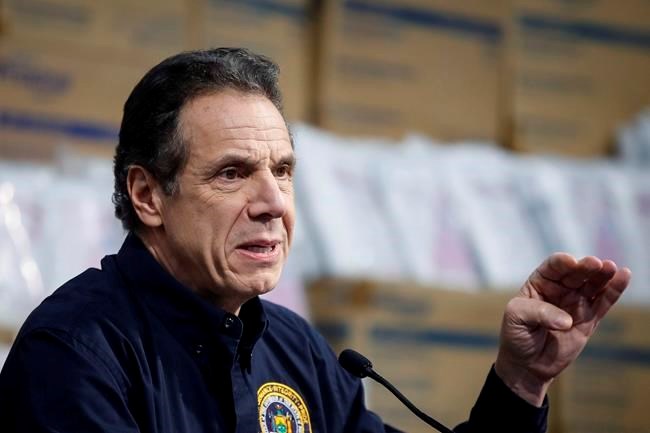WASHINGTON — The angry din of car horns echoed through Virginia's capital city Wednesday as the debate about America's path to recovery pitted impatient U.S. workers and business owners against governors and health experts who fear a crippling resurgence of COVID-19.
A procession of vehicles paraded past the state capitol in Richmond in hopes of convincing Gov. Ralph Northam to lift a stay-at-home order and let people go back to work — a carbon copy of protests in Pennsylvania, Michigan, Tennessee and Maryland, among others.
The protests have been widely linked to the country's pro-gun lobby and conservative action groups that support Republican President Donald Trump, fuelling doubts about whether they represent a wider impatience in the U.S., particularly since polls have continued to suggest widespread bipartisan support for the restrictions.
But whatever their genesis, the result is the same: there is mounting political pressure on governors and municipal officials — even in hard-hit New York state, where more than 20,000 people have died — to rouse the dormant U.S. economy.
"This is no time to act stupidly. Period. I don't know how else to say it," said New York Gov. Andrew Cuomo. Like Northam in Virginia, Cuomo is a Democrat.
"This is not going to be over any time soon. I know people want out, I get it. I know people want to get back to work. I know people need a paycheque. I know this is unsustainable. I also know more people will die if we are not smart."
The contrast of Cuomo's message with that emanating from other states, particularly Republican-led states in the Deep South, was jarring.
In Georgia, which was reporting nearly 20,000 active cases Wednesday and 836 deaths, Gov. Brian Kemp expects to have many businesses — including hair salons and tattoo parlours, where physical distancing is impossible — back up and running as early as Friday. In Tennessee, the plan is for shops and services to reopen next week.
Even Trump, who has to date championed a prompt reopening, conceded that Kemp was getting ahead of the White House guidelines for a phased-in reopening of certain businesses and institutions. But he stopped short of saying he would intervene.
"I disagree strongly with his decision to open certain facilities which are in violation of the Phase 1 guidelines," the president said. "At the same time, he must do what he thinks is right ... but I disagree with him on what he's doing."
Governors who choose to roll the dice would likely be more inclined to do so if they knew that the recent protests were an organic expression of public sentiment, said Matthew Mitchell, a professor of international business and strategy at Drake University in Des Moines, Iowa.
But even if they're inauthentic, they still provide a measure of handy political cover, Mitchell said.
"In some ways, it definitely gives coverage to those governors that have the predisposition to open their economies more quickly," he said. "That's the chess match these competing narratives are playing out."
In Canada, which negotiated with the U.S. a mutual ban on non-essential travel between the two countries that has since been extended until May 21, a similarly segmented approach to reopening is beginning to emerge — albeit one shrouded in caution and caveats.
Prince Edward Island, where the COVID-19 caseload is low, is aiming to start lifting restrictions on outdoor activities and elective surgeries late next week, with an eye towards reopening businesses in mid-May, Premier Dennis King said Tuesday. New Brunswick is optimistic it could adopt a similar timeline.
"The different provinces will make different decisions about how and where to start restarting, reopening their economies. We are going to work to co-ordinate, so that we’re basing ourselves on shared values, principles and scientific approaches right across the country," Prime Minister Justin Trudeau said Wednesday.
That, however, isn't going to translate into any sort of phased-in changes to Canada's border agreement with the U.S. any time soon, he added.
"We will continue to co-ordinate with the United States, but the national measures will apply right across the Canada-U.S. border, regardless of provinces or jurisdictions."
As the situation in the U.S. continues to evolve, Canada and its leaders, themselves not immune to the influence of political pressure, could eventually end up in an awkward position, Mitchell said.
"Canada definitely has to think long and hard about the health and economic impacts of opening up too soon and following its larger cousin to the south," he said.
"Canada is still critically intertwined with the U.S. economy, so I just don't think it can ride off into the sunset and be self-sufficient any time soon. Nor can we, frankly. But the conversation and decision needs to be informed by domestic health issues and domestic economic issues."
This report by The Canadian Press was first published April 22, 2020.
— Follow James McCarten on Twitter @CdnPressStyle
James McCarten, The Canadian Press



